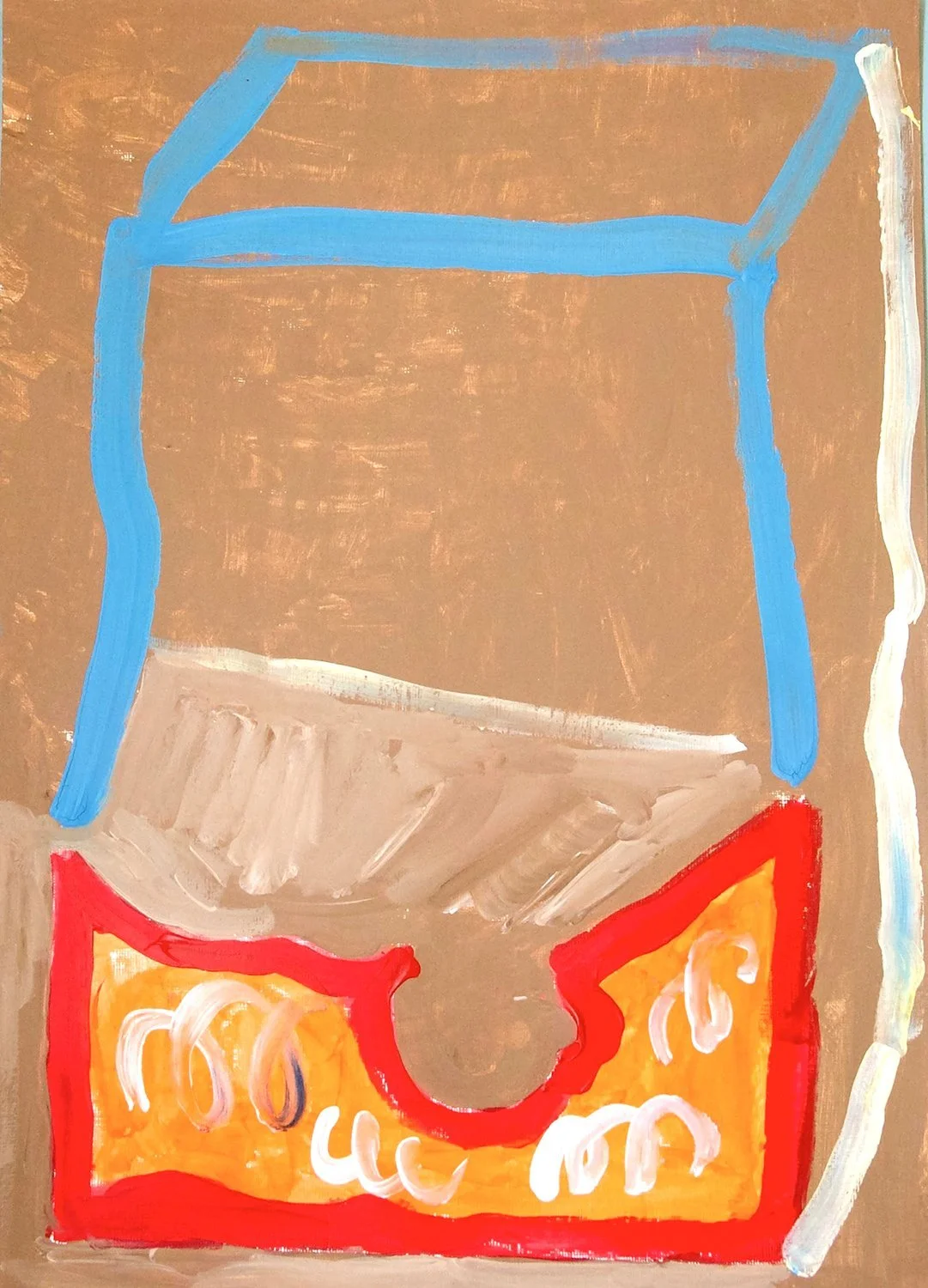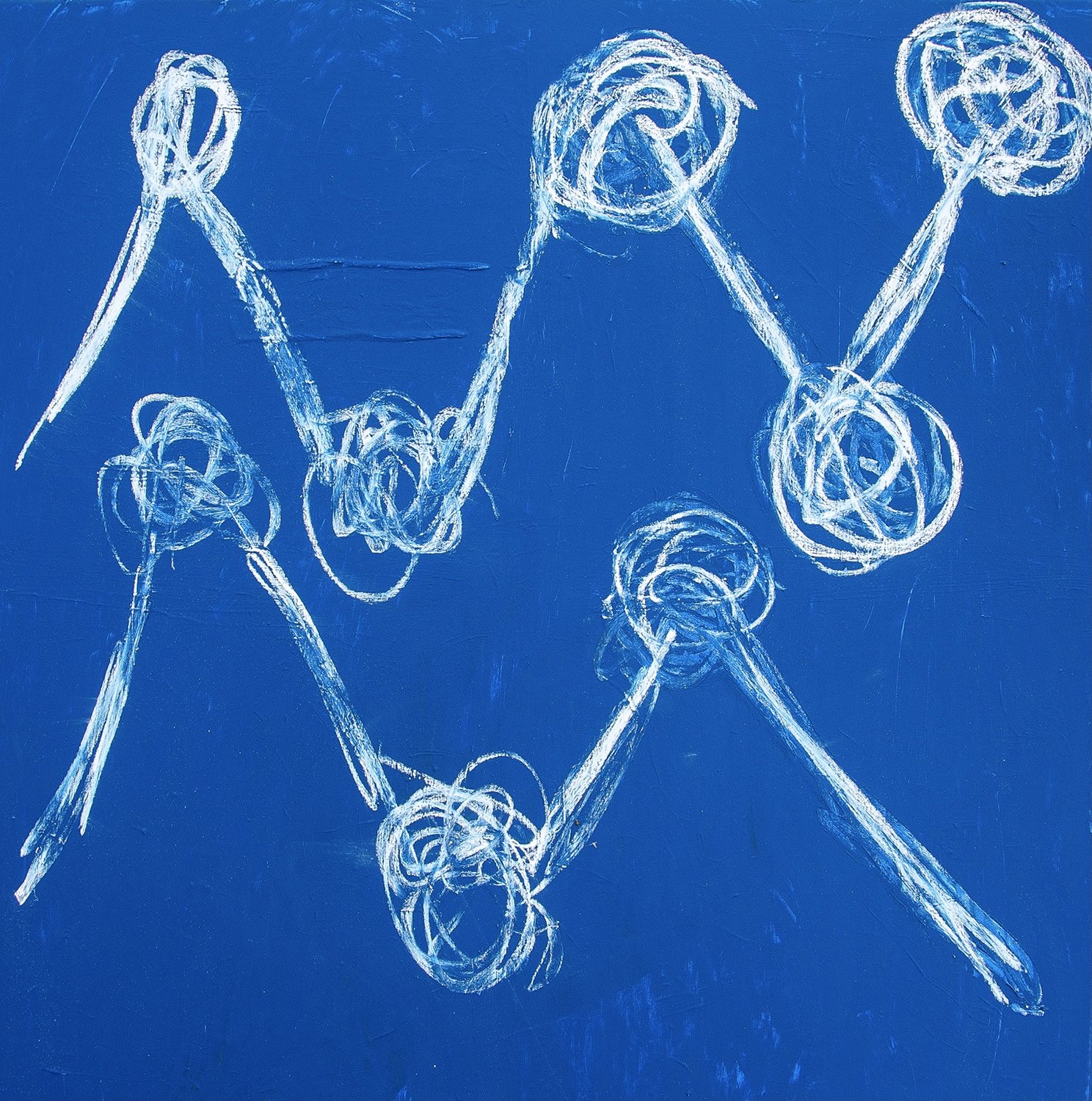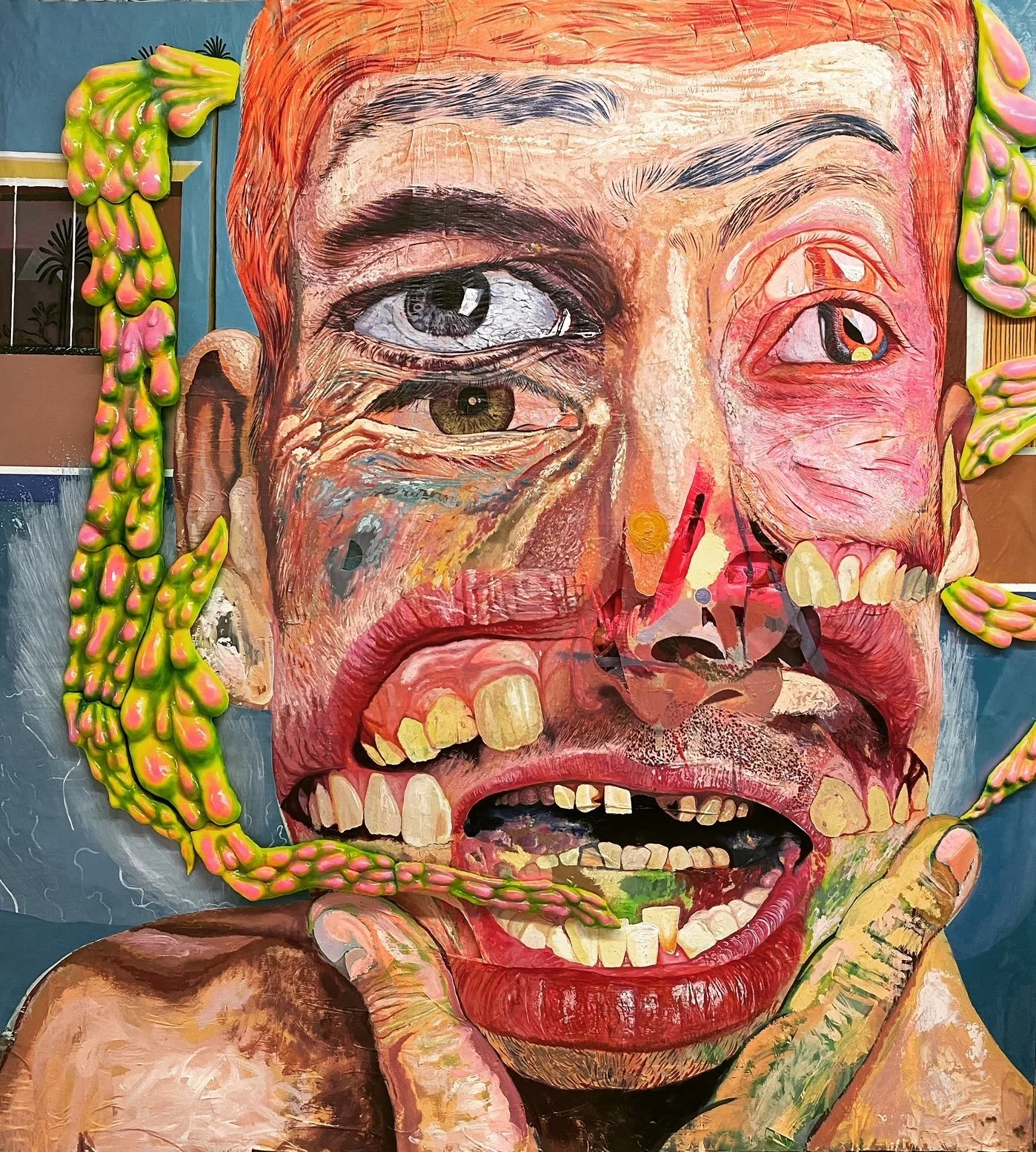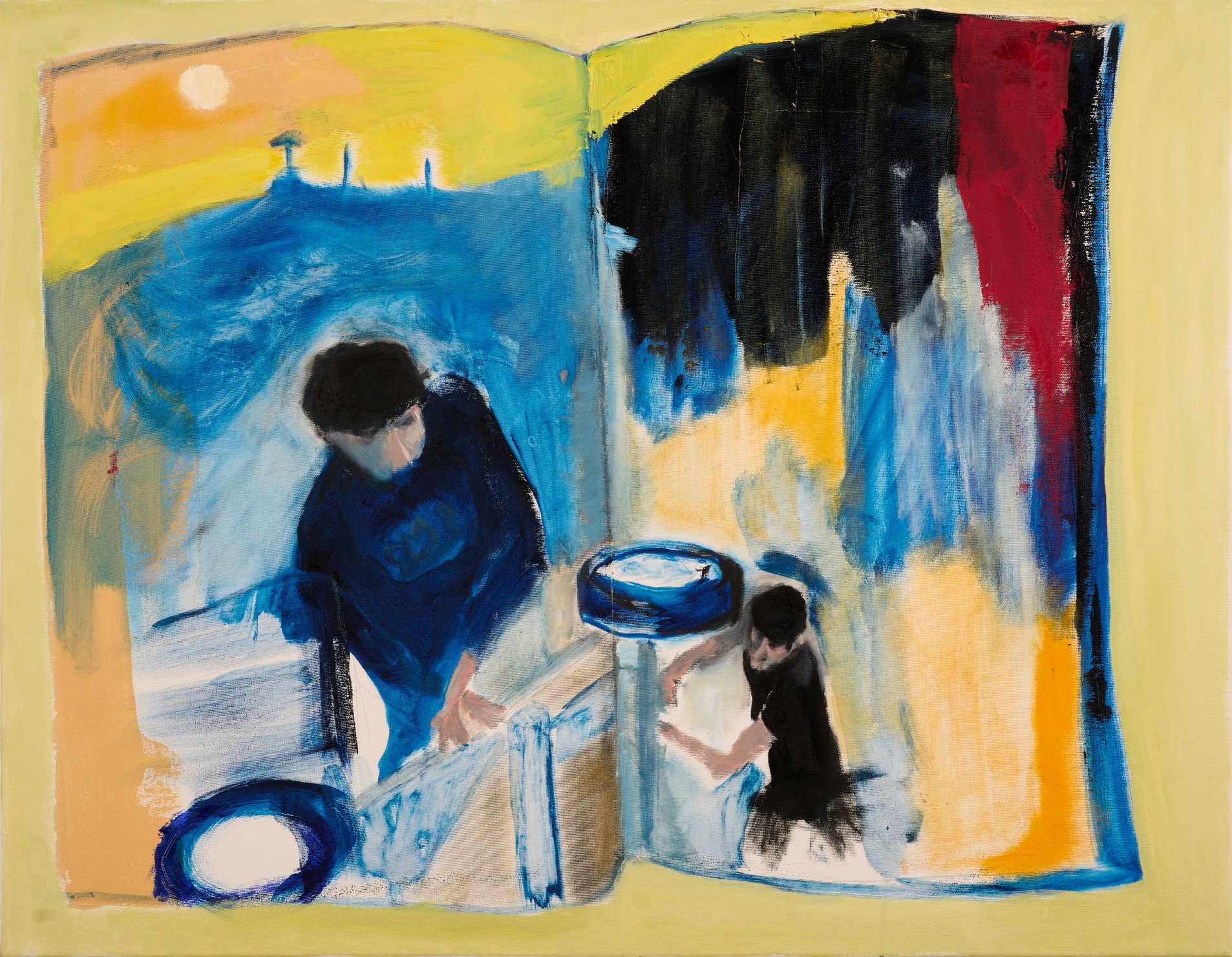10 Questions with Jerry Helle
Featured BACK COVER artist - THE ORIGINAL ISSUE10
Jerry Helle is a 22-year old Cameroonian artist. He currently lives and works between Cologne, Germany, Douala, Cameroon, Houston, Texas, and Lisbon, Portugal. His artworks are exhibited across Germany and published in the UK.
jerryhelle.myportfolio.com | @jerryhelle
Jerry Helle in his studio
ARTIST STATEMENT
His work represents contrasting value systems, his home in Cameroon and what is now home abroad, the dynamics of his family’s history, postcolonial theories. Ultimately spirituality plays a major role in his work. Working primarily with abstract painting as the deliberate reduction to the essential is fundamental in Jerry Helle’s artistic work. Through textures, shapes, and colours Helle depicts an understanding of his physical, spiritual, and emotional reality.
Absence of blue, Acrylic and chalk on canvas, 30x20 cm, 2021 © Jerry Helle
INTERVIEW
First of all, let's talk about your background. Could you tell us a little more about yourself and how did you begin making art?
My creative practice started in my early childhood. Coming from the Bamoun people in the northwest region of Cameroon, creativity and craft are deeply rooted and encouraged in my culture. From early on, I've been experimenting with different mediums - from singing to sculpting to performance, drawing, and writing, finding comfort in creative expression. Choosing painting as my primary medium started in my teenage years and flourished during my stay in Europe as paint and brushes are not easily accessible in Cameroon.
When did you decide to become an artist? And what do you wish you knew about contemporary art before you got started?
I cannot pin down a specific point in time at which I decided to become an artist. Rather, it has been a process of investing more and more time in bettering my art, regularly exhibiting and surrounding myself with artists that art became my main occupation. What would I have wished to know before? I always thought of contemporary art to be very innovative and open-minded. However, starting my career in Europe, I have found the contemporary art scene rather conservative, classist, and sometimes one-dimensional. We still have a very dominant system of galleries and academic institutions without necessarily reflecting its inequality and inaccessibility. Further, I observe a still prevalent underrepresentation of talent. I hope, in the future, artists can have more impact on the contemporary art market, both primary and secondary.
Boxed, Acrylic on paper, 42x29,7 cm, 2020 © Jerry Helle
You come from Cameroon, but you are currently based in Germany, and in your work, you often deal with the concept of home and what it means. How do these two different environments influence your work? And what is home to you now?
Cameroon is a very abstract place with contradicting extremes and little to no in-between. Growing up, I often found myself seeking an understanding of how people living in the same place can have such contrasting realities and experiences. Coming to Germany at 18 years old, I was confronted with a very different social organization. Fewer extremes and a more common idea of living. I felt challenged in my understanding of the world, and although I learned a lot about life and myself in Germany, I didn't feel a sense of belonging even after years. This ultimately led to me creating a feeling of home inside of me that I today carry along wherever I go. My work in Germany definitely reflects and explores this process. Being in Germany during times of social change, especially the Black Lives Matter protests in summer 2020, influenced my idea of what my art stands for, introducing political expression. Today, at 22 years old, I find myself again in a new environment. Relocating to the United States last November again challenged new artistic positions and ideas.
Let's talk about your creative process. Where do you draw inspiration from nowadays?
As mentioned above, the environment I am in impacts my artistic practice, more specifically, how I interact and feel in different parts of the world. Further, I draw lots of inspiration from human encounters and conversations. Since I was a child, I felt very connected to elders, benefiting from their wisdom and perspective on life. Equally, I enjoy interacting with children who have an optimistic, innocent idea of life. I like to let these perspectives influence my own and discover unknown ways to look at familiar situations. But foremost, the main source of inspiration in my art remains the rituals and knowledge of my ancestors and their impact on today's world.
African Education, Acrylic and chalk on canvas, 100x100 cm, 2021 © Jerry Helle
When it goes up, it goes down, Acrylic and chalk on canvas, 100x100 cm, 2021© Jerry Helle
What is your artistic routine when working? Please walk us through a day in your studio.
A day in my studio begins early in the morning between 4 and 5 am. I avoid using technology and other possible distractions to be as clear-stated as possible. Meditation is also a great tool to be more in touch with my inner self. I usually start by pinning my canvas to the wall and letting my intuition sketch the work. I reflect on my emotional state and what is currently occupying my thoughts. I range between painting in silence or listening to Black musicians like Nina Simone, Richard Bona, and Ella Fitzgerald, among other inspirational figures. Since relocating to the USA, my art has become more research-based as I explore different parts of American history and emotionally charged topics that require preparation. Although therefore my art is rather planned than intuitive, the core concept of my practice remains the creation and destruction of presets and the intertwining of both.
Your intricate paintings aim to evoke powerful emotions in the viewers. How do you achieve this goal?
I like to work with dynamic movements in stroke and carvings. The latter carries a spiritual meaning rooted in Bamoun culture. From carving wood to scarification on the body, this practice is an ancient form of expression and deep meaning to my people and my very self. Working with abstraction, I prefer conveying emotions and ideas nonfigurative in color, shape, and texture, allowing more freedom in interpretation and relating to the work.
Over the past two years, we have witnessed a growing number of online exhibitions and live events. What do you think of the recent changes in the art world? Do you miss the art world as it was before the pandemic, or do you see more opportunities now?
Although I find the digitalization of the art world very interesting and beneficial in many ways, I feel it always carries certain limitations in fully connecting with one another. I do miss in-person exhibitions and conversations about my art, for it allows me and my work to interact with the viewer authentically.
Fallout Bird, Acrylic on wood, 100x90 cm, 2020© Jerry Helle
The life of a cylinder, Acrylic and chalk on canvas, 80x80 cm, 2020 © Jerry Helle
What are you working on now, and what are your plans for the future? Anything exciting you can tell us about?
As earlier mentioned, I relocated to the USA, where I am currently working on a project exploring Liberation, Autonomy, and Empowerment in the world's second-largest African diaspora. Being in Texas, a state of immense cultural and historical importance to Black Americans, allows me to cast new perspectives on my perception and ethics. Equally, I am working on an exhibition called "The child's drawing book" aiming to open a dialogue between generations on how childhood physical and emotional environment plays a major role in a child's upbringing. In the future, I look forward to having a studio space in Paris and joining a residency in Senegal or Ghana.
What do you hope to accomplish this year, both in career goals and personal life?
This year, in my personal life, I want to reunite with my siblings and mother again, whom I have not seen since last summer as we are all spread across countries. I want to leave my comfort zone further and challenge what is known and familiar, constantly reinventing myself and embracing change. Career-wise I look forward to having my first solo exhibition in the US and having my art displayed in public, reaching a wider audience. I want to be in as many conversations as possible about my art as it truly sparks joy in me to have my work be seen and talked about. Lastly, I want to paint on a large scale - I have a 200x500cm canvas in mind - and have the work exhibited.
Finally, share something you would like the world to know about you?
I have a business background in consulting, though I don't plan to actually use it any time in the future.


























